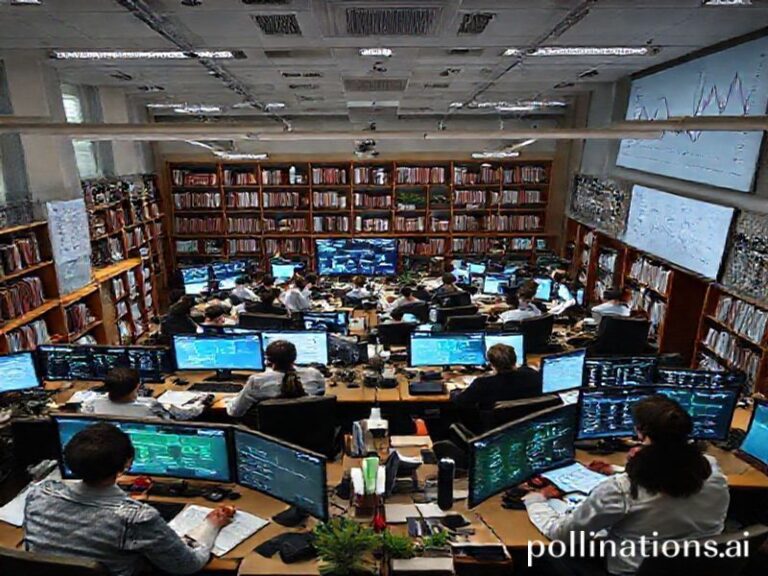How Halsey Accidentally Became a UN Power Broker: Pop, Politics, and the Global Attention Economy
Halsey at the Border: How a Pop Star Became a Geopolitical Flash-Mob
It began, as most millennial crises do, with a tweet. Ashley Frangipane—stage name Halsey, for those who still confuse her with a British motorway—posted a grainy video from a muddy field outside Rafah, Gaza, insisting that the world “look up.” Within minutes, the clip ricocheted from a fan account in São Paulo to a K-pop forum in Seoul, where users overlaid it with a lo-fi remix titled “Ceasefire & Chill.” By breakfast in Brussels, EU officials were being asked whether a woman who once rhymed “hopeless” with “motel mattress” now qualified as a non-state actor. The short answer: only on Tuesdays.
Of course, celebrity activism is hardly new. We’ve watched Madonna adopt Malawian orphans like Pokémon, and Leonardo DiCaprio lecture the UN on carbon while arriving by private jet. But Halsey’s intervention felt different—less charity gala, more flash-mob. A generation that streams wars on TikTok suddenly had a three-minute chorus they could loop while doom-scrolling. Overnight, the hashtag #HalseyEffect trended higher than the yen, and Japanese trading algorithms briefly mistook it for a new crypto token. Tokyo’s Nikkei dipped 0.3 percent before officials clarified that, no, you cannot hedge geopolitical risk with limited-edition vinyl.
Across the Atlantic, France debated whether to grant Halsey honorary citoyenneté for services to existential angst. Le Monde ran a 2,000-word editorial comparing her to Simone de Beauvoir, if de Beauvoir had 47 million followers and a makeup line at Sephora. Meanwhile in Moscow, state television rebranded her as “the American siren weaponizing empathy,” which is arguably the most flattering thing RT has ever said about an openly bisexual woman from New Jersey.
But the real tremors were felt in the Global South. In Lagos, Afro-pop producers sampled her on-the-ground audio (“They’re shooting at medics”) into a track that topped charts from Accra to Johannesburg. Kenyan TikTokers repurposed it for videos protesting their own police brutality, proving once again that suffering is the most remixable genre. Even Beijing’s censors briefly allowed the clip to circulate—albeit with subtitles that translated “occupation” as “extended camping trip.” By the time someone deep-faked Halsey’s face onto Kim Jong-un singing “Without Me,” the meme had circled the planet twice and acquired diplomatic immunity.
Western diplomats, ever eager to outsource moral authority to anyone with verified checkmarks, invited her to brief the Security Council via Zoom. She logged in wearing a T-shirt that read “Y’all Needed a Bisexual Pop Star to Care About War Crimes,” instantly becoming the most honest thing ever uttered in that chamber. Russia abstained from blocking the ceasefire resolution, claiming it was “moved by the key change in the second verse.” Analysts still argue whether that was sarcasm or the first recorded instance of G7 trolling.
Yet beneath the spectacle lies a sobering metric: UNICEF reported a 600 percent spike in donations after Halsey shared a Gaza children’s hospital fundraiser. Somewhere between the cynicism and the serotonin, human empathy flickered. The same algorithms that radicalize uncles at Thanksgiving also, it turns out, can crowdfund trauma kits. It’s an inconvenient truth for anyone invested in the narrative that the internet is a moral wasteland—though, to be fair, it’s still mostly that. One viral moment does not a revolution make; it merely offers the world a synchronized three-minute dance before the next atrocity drops.
So what does it mean when a pop star’s off-key warble carries more multilateral weight than a dozen white papers? Perhaps only that soft power now comes with a Spotify playlist. Or that in an age when nation-states outsource their consciences to celebrities, we should at least hope the celebrity can carry a tune. Halsey may not end wars, but she’s given them a better soundtrack than the usual drone-cam dirge. And in a world where attention is the scarcest resource, that’s a kind of currency too—spend wisely, or watch it inflate into oblivion.







